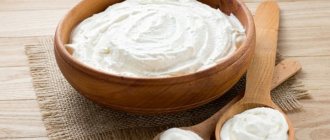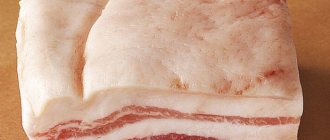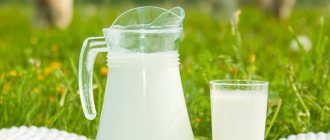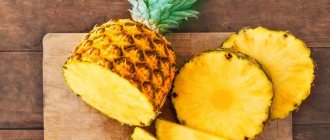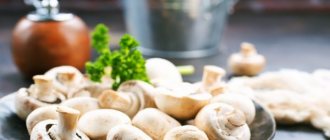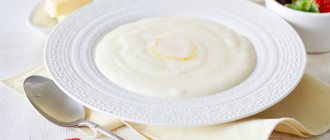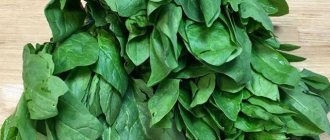12/13/2017 Category: Nutrition for a nursing mother Author: Lyudmila Morozova
Just a few years ago, soy sauce in our country was considered a delicacy; it was used only for preparing Asian dishes. Today this seasoning is one of the most popular. It is used for marinating meat and fish, dressing salads, and eaten with sushi and rolls. The use of this product during breastfeeding is permissible, subject to the rules of caution and confidence in the high quality of the sauce. By practicing a competent approach to choosing and consuming this dressing, a nursing mother will be able to enjoy the exquisite taste of food without compromising the well-being of the baby.
- Composition of soy sauce
Table: chemical composition and nutritional value
Production technologies
The original soy sauce recipe was developed several thousand years ago in China. Later it was brought to Japan by Buddhists and improved for centuries. Thanks to their efforts, today Japanese sauce is made from soybeans with the addition of roasted wheat, and fermentation lasts for years. The production technology is that soybeans are preliminarily subjected to heat treatment, then mixed with wheat or barley, salt is added (ideally sea salt) and placed in bags or barrels and exposed to the sun. Over a long period (from several months to 3 years), natural fermentation occurs, during which soy sauce is released . The resulting “juice” is filtered and bottled. This is real soy sauce, which does not require preservatives or colorings. Its natural color is red-brown and its natural antiseptic properties avoid the addition of preservatives.
Natural product produced by natural fermentation of soybeans
In the 20th century, another scenario for the production of soy sauce on an industrial scale was developed, which had a detrimental effect on its beneficial properties. In order to speed up the fermentation process, chemicals containing hydrogen chloride began to be added to the raw materials . As a result, it became possible to obtain the finished product in just a few weeks. True, the characteristic taste, aroma and color cannot be obtained. This problem is solved by adding chemical ingredients or, at best, using caramel coloring, salt and corn syrup. However, the greatest danger is posed by the substance chloropropanol, a carcinogen released during accelerated fermentation. Its content in finished products is not controlled and can be extremely high.
When considering soy sauce as a seasoning in the diet of a nursing mother, it should be clarified that the “artificial” product is contraindicated during breastfeeding. It is permissible to use only real soy sauce, obtained through natural fermentation without chemical additives. In this case, it is necessary to take into account a number of additional nuances - dosage, possible contraindications, age and individual characteristics of the baby.
Why can't pregnant women have sushi?
Japan is a maritime country, so it is not surprising that fresh fish forms the basis of the diet of eastern nations. They are confident in the quality of the product, because seafood is collected daily. Accordingly, the Japanese consume sushi and sashimi constantly, including during pregnancy.
Unfortunately, most countries in Eastern Europe are landlocked, which means there are no guarantees of seafood freshness. In order to avoid contracting dangerous infections, pregnant European women must strictly follow the recommendations for the selection and frequency of consumption of oriental delicacies.
Composition of soy sauce
Soybeans, from which soy sauce is extracted, are the main meat substitute in vegetarian menus. The chemical composition of soybeans is similar to meat products, especially in protein quality. At the same time, soybean vegetable protein is more easily absorbed. Iron is also present in soy, but its concentration is lower than in meat, and it is less absorbed.
A high-quality product is made from soybeans using the fermentation method
High-quality soy sauce is rich in essential amino acids, obtained by the body only from food and not produced independently. Being a powerful antioxidant, this food product helps fight cancer cells, heals the body, promotes hematopoiesis and speeds up the recovery process after childbirth. The rich mineral composition has a beneficial effect on the functioning of the cardiovascular, nervous, and maternal and infant systems. The low calorie content of the sauce allows you to use it as a dressing for a wide variety of dishes without fear of gaining excess weight.
This product has significant disadvantages. Soy sauce is a product that can cause allergies in a baby. The seasoning contains a record amount of salt, exceeding the daily norm even when consuming only 40 g - the portion allowed during breastfeeding. This creates a load on the kidneys and liver, provokes swelling and stagnation of fluid in the body. Soy sauce can also have a negative effect on lactation: it slightly reduces the volume of milk, retaining liquid in the tissues, and gives it a salty taste, which the baby may not like.
Table: chemical composition and nutritional value
| Nutrient | Contents per serving 40 g | % of the daily value of 40 g* |
| Calories | 20.3 kcal | 1.43% |
| Squirrels | 2.5 g | 4% |
| Fats | 0 g | 0% |
| Carbohydrates | 2.7 g | 2.11% |
| Vitamin B1, thiamine (mg) | 0,01 | 1% |
| Vitamin B2, riboflavin (mg) | 0,07 | 4% |
| Vitamin B4, choline (mg) | 7,32 | 1% |
| Vitamin B5, pantothenic (mg) | 0,12 | 2% |
| Vitamin B6, pyridoxine (mg) | 0,06 | 3% |
| Vitamin B9, folate (mcg) | 5,6 | 1% |
| Vitamin PP, Niacin | 0,88 | 4% |
| Calcium, Ca (mg) | 7,6 | 1% |
| Magnesium, Mg (mg) | 17,2 | 4% |
| Sodium, Na (mg) | 2254,8 | 173% |
| Phosphorus, P (mg) | 50 | 6% |
| Iron, Fe (mg) | 0,77 | 4% |
| Vitamin RR, NE (mg) | 1,48 | 7% |
| Potassium, K (mg) | 86,8 | 3% |
| Manganese, Mn (mg) | 0,17 | 9% |
| Copper, Cu (mg) | 0,04 | 4% |
| Zinc, Zn (mg) | 0,21 | 2% |
*% of the daily value of 40 g - approximate values for a nursing woman.
Beneficial features
Pre-marinating fish in soy sauce will allow you to prepare the product without salt.
All of the beneficial qualities under consideration are inherent in naturally fermented soy sauce, without the addition of dyes, preservatives and other chemical additives. Such a product is inappropriate in the diet of a nursing mother and does not contain useful components. A high-quality sauce, when consumed wisely, will bring more benefit to mother and baby than harm. Here are the main advantages of this seasoning.
- Contains phytoestrogens. These natural antioxidants prevent the development of free radicals in cells and help remove heavy metals and toxins from the body. In eastern countries, soy sauce is called the “elixir of youth” for its positive effect on blood circulation and immunity. Natural phytoestrogens help regulate the hormonal levels of a young mother.
- Source of valuable amino acids. Soy sauce contains more than 20 essential amino acids involved in protein synthesis. Thanks to this, building material for body cells is formed.
- B vitamins. Necessary for maintaining healthy vision and the functioning of the nervous and cardiovascular systems. Improve metabolism, promote tissue regeneration, healing of birth sutures.
- Vegetable protein. The composition of soy protein is close to that of animals and promotes the formation and strengthening of muscle tissue.
- Contains tryptophan. This substance has a sedative effect - calms the nerves and improves mood.
- Diverse mineral composition. Soy sauce contains valuable micro- and macroelements: calcium, zinc, iron, manganese. The product will allow you to diversify your diet with nutrients necessary to maintain immunity, which also penetrate into breast milk.
The benefits and harms of soy lecithin
Soy lecithin contained in this product plays one of the main roles in the body. This substance is involved in the restoration of nerve tissue and brain cells. In addition, lecithin is responsible for thinking, learning, motor activity and memory. It perfectly regulates blood cholesterol levels and fat metabolism, allowing you to maintain functions at the unique level of a young body, that is, it helps fight not only diseases, but also aging.
Soy lecithin in industry is a product that belongs to the group of emulsifiers used for mixing substances with different physical and chemical properties (density, consistency, etc.). Soy lecithin is a food additive known in Russia under the code E322.
Industrial soy lecithin is found in bread, margarine and spreads, chocolate, sausages, semi-finished products (cutlets, filled pancakes), fast food products, dairy products and baby food.
Natural soy lecithin is a very healthy product!
Composition of natural soy lecithin:
- Kholin,
- Phosphodiethylcholine,
- Inositol,
- Phosphates,
- Linolenic acid,
- B vitamins.
Soy lecithin can be found in the form of a dietary supplement (biologically active food supplement), which is used for lipid metabolism disorders, heart and vascular diseases, memory disorders, pregnancy and liver diseases. If this additive is included in the composition of a cosmetic product, it combines elements of a cream or emulsion of different consistency, and also nourishes, moisturizes and smoothes the skin of the face and body.
Benefits of natural soy lecithin:
- Stimulates metabolism - destroys fats, relieves stress on liver cells, prevents obesity;
- Strengthens the heart muscle and cleanses blood vessels from cholesterol plaques - phospholipids in soy lecithin are involved in the formation of valuable amino acids that strengthen the myocardium;
- Helps the functioning of brain cells, the preservation and development of memory - during the development and growth of the child, it replenishes the composition of the brain matter, which normally consists of one third of lecithin;
- Stimulates bile secretion - by dissolving fats, lecithin makes bile liquid, preventing the formation of deposits on the walls of the bile ducts and bladder;
- Protects nerve fibers from stress by forming their myelin sheath;
- Reduces the craving for smoking - the neurotransmitter acetylcholine in soy lecithin helps brain receptors wean themselves from nicotine addiction.
Harm. Natural soy lecithin is practically harmless; the only possible harm is individual intolerance to the product. Lecithin, produced from modified soybeans (for industry), stimulates obesity, depression and memory impairment, and disruption of the endocrine system.
Possible negative impacts
Sushi is the most popular dish combined with soy sauce, but during lactation it is not recommended to eat raw fish.
The greatest harm to mother and baby is a surrogate passed off as soy sauce, prepared in violation of production technology and containing hazardous substances. However, even a high-quality product can negatively affect the baby. Let's take a closer look at the possible side effects.
- Negative effects on the endocrine system. It is known that regular consumption of soy can provoke thyroid diseases. Because of this, soy sauce is contraindicated for young children.
- Allergy risk. Soy is a highly allergenic product, and its components can pass into breast milk after consuming soy sauce.
- Inhibition of intellectual development. Soy sauce contains antioxidants that can eliminate the symptoms of menopause. But they can have a negative impact on the baby’s brain activity if the mother “abuses” soy sauce during lactation.
Contraindications for mother:
- hypertension;
- kidney diseases;
- individual intolerance.
What kind of sushi can pregnant women eat?
An alternative to store-bought dishes can be homemade rolls. The advice here is the same as before: prefer vegetables, refrain from sauces and seasonings, fry fish.
If you really can’t bear it and really want raw fish, then you should first leave it in the freezer for about 24 hours. It is believed that in this way you can disinfect the product and protect yourself from possible consequences.
Marinated, smoked, salted fish does not pose a threat to parasites, but can cause a negative reaction in the gastrointestinal tract, so it is worth limiting its consumption.
To avoid allergies, pregnant women should absolutely avoid ginger.
Rules for using soy sauce while breastfeeding
Use soy sauce between feedings to reduce the concentration of potential allergens in breast milk.
Soy sauce is not prohibited for a nursing mother, but it must be eaten with caution.
- Only natural product. Introduce soy sauce into your diet if you are sure that it is produced using traditional technology without harmful ingredients.
- The baby is at least 4–6 months old. The younger the baby, the more sensitive he is to foods in the diet of a nursing mother, and there is a higher risk of developing allergies.
- Start with 1 teaspoon. Portions are increased gradually - by 1 teaspoon each time, observing the baby's reaction. The daily norm during lactation is 30–50 g, no more than 2 times a week.
- Remove from diet if signs of allergies or digestive problems appear.
I marinated chicken in soy sauce, everything was fine)) but if you just eat it like that, you can try a little
Maria
https://www.baby.ru/community/view/3335924/forum/post/21931395/
yes, in principle, you can, just buy it at a higher price and not for 3 rubles) and watch the baby’s reaction)
★★★ksanna★★★
https://www.babyblog.ru/user/—Katerinka—/2575050
I ate the rolls a little bit in the sauce, but didn’t eat the wasabi
lionochik
https://www.u-mama.ru/forum/kids/0–1/179418/index.html
Doctors' opinions on the benefits of soy
According to the overwhelming majority of doctors, products made from soy are harmless if there are no contraindications to them and a person does not abuse them. If these two conditions are not met, then as a result you can “earn” health problems.
- For weight loss, soy products are also very important: compared to regular ones, some of them contain more nutrients, so you will not feel a loss of strength during the diet.
- In addition, due to the presence of a high percentage of protein, athletes can undoubtedly use them for cutting in order to quickly lose excess fat and build muscle mass.
How to choose a product in a store
Carefully study the information on the label before purchasing.
Traditional soy sauce is not only healthier than a chemical substitute, but also much tastier and more aromatic. It can be used instead of salt in many dishes made from vegetables, meat, fish, and added to side dishes. There are varieties of sauce with less salt content than the classic version; they have a sweetish taste, which is provided by sugar and vinegar in the composition. For sushi and rolls, there are special varieties on sale that successfully highlight the taste of seafood. However, the main goal when choosing soy sauce for a nursing mother is to find a quality product and be able to distinguish it from a chemical surrogate. Be guided by the following principles.
- List of ingredients. The composition should contain only water, soybeans, wheat or barley, and salt. If the composition contains preservatives, flavor enhancers, and flavoring agents, such soy sauce is undesirable.
- Price. The low cost of a bottle of soy sauce is a sign of poor quality. Natural fermentation technology requires time and effort. Real soy sauce cannot cost less than 200 rubles for 200–250 ml of product.
- Protein content. In soy sauce, the proportion of protein should be at least 7–8%.
- Color and smell. Real soy sauce is slightly clear and red-brown. Its aroma is slightly sweet and appetizing. The surrogate, as a rule, is cloudy, dark, with sediment, and has a chemical smell.
- Tara. Soy sauce should be packaged in dark glass containers. This way it will retain its beneficial properties.
- Expiration dates. Make sure the product has a long shelf life - about 2 years.
At home, it is recommended to store an open jar of soy sauce in the refrigerator - there it will be protected from heat and light.


